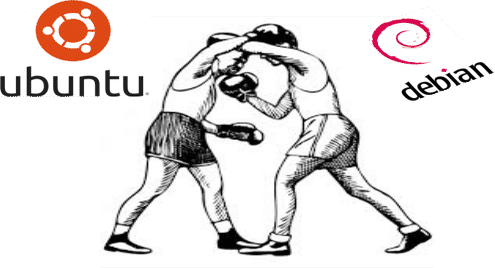Background
First announced in 1993 by American software engineer Ian Murdock, Debian is one of the oldest operating systems based on the Linux kernel. As such, it has become the base of many newer Linux distributions, including Ubuntu, which was released in 2004 by Canonical, a UK-based computer software company founded and funded by South African entrepreneur Mark Shuttleworth.
Even though Debian and Ubuntu share the same base, their goals are somewhat different. Debian strives to develop a free (as in freedom) operating system by following the Debian Social Contract. This contract states that Debian will forever remain free and will always give back to the Linux community, including projects such as Ubuntu.
Ubuntu, on the other hand, follows the Southern African philosophy of ubuntu, which can be roughly translated as “humanity to others.” In practice, Ubuntu’s goal is to build upon the fragmented Linux ecosystem and produce an easy-to-use Linux distribution for everyday use and distribute it free of charge.
Releases
There are three branches of Debian: stable, testing, and unstable, with only the stable branch having a specific release date. The other two branches are updated continuously until they become the stable branch.
Debian users typically choose the testing branch, as it strikes a happy medium between the stability of the stable branch and the bleeding-edge of the unstable branch without being neither too out-of-date nor too unstable.
Ubuntu follows a set release cycle. A new version of Ubuntu is released every 6 months, and a new LTS (long-term support) version is released every 2 years. Each release of ubuntu starts from the testing branch of Debian, and LTS releases are supported for 5 years, whereas the stable releases of Debian are only supported for 3 years.
Ubuntu is available in several officially supported variants and many flavors without any commercial support. The official supported variants include Ubuntu Desktop, Ubuntu Server, Ubuntu Cloud, and Ubuntu Core, which is aimed at single-board computers such as Raspberry Pi.
Ubuntu flavors are backed by the full Ubuntu archive for packages and updates, and each of them comes with its own choice of default applications and settings. For example, Kubuntu offers the KDE Plasma Workspace experience, and Xubuntu uses the Xfce desktop environment, instead of Ubuntu’s GNOME Shell.
Installation
Both Debian and Ubuntu offer the choice between all popular desktop environments—Debian during installation and Ubuntu before it with its flavors.
Each of Debian’s three branches is available for a number of architectures, including amd64, ia64, i386, arm64, arm, mipsel, ppc64, and others. The supported methods of installing Debian include torrent downloads and network images.
Ubuntu also supports multiple architectures, including amd64, ppc64, and arm, but not as many as Debian. Ubuntu is typically installed using live images, but other installation methods are also available.
Both Debian and Ubuntu can be installed using a graphical installation program called Debian-installer, but Ubuntu defaults to Ubiquity, a simplified graphical installation program based on parts of Debian-installer.
After installation, one major difference between Debian and Ubuntu is the fact that sudo is not installed on Debian by default. As such, users have to change a login session’s owner using the su command to execute commands as root.
Package Management
Because Debian and Ubuntu share the same apt package management system, and because Ubuntu draws its packages from Debian’s repositories, software available for Debian is virtually always also available for Ubuntu. In fact, Ubuntu’s software is typically more up to date because of its faster release cycle and a larger user base. While it’s possible to add the same repositories to both distributions, compatibility isn’t guaranteed due to version differences between packages.
By default, Debian doesn’t allow for the installation of proprietary software. If users choose to install it, they must manually enable the corresponding repositories, such as Deb Multimedia, which contains multimedia packages for stable/testing/unstable, including non-free software. Ubuntu ships with and allows for the installation of proprietary software by default.
To help users develop and maintain software, Canonical released a web application and website called Launchpad. This collaboration platform serves as a community support site, knowledge base, bug tracker, source code hosting service, and more.
Apart from the apt package management system, both Debian and Ubuntu also support snaps, which are containerized software packages developed by Canonical that are simple to create and install.
Conclusion
While each developed according to a different philosophy, Debian and Ubuntu still share many similarities and are suitable for similar applications. Whereas Debian is able to provide excellent stability with it stable branch, Ubuntu delivers a pleasant desktop experience and more up-to-date packages.


